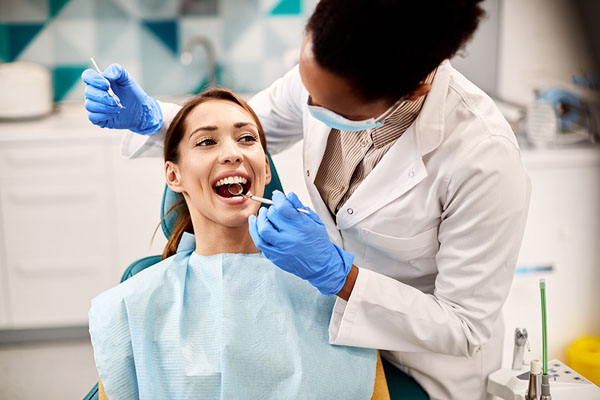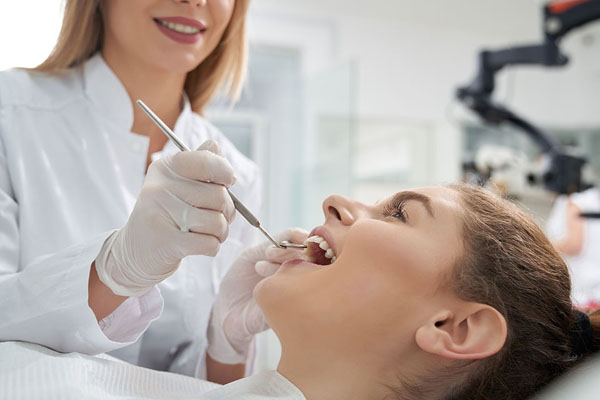Dental Cleanings in Fort Wayne, IN
Keep Your Smile Beautiful and Healthy With Our Fort Wayne Dentist
A beautiful, healthy smile can do wonders for your self-confidence and oral health. By keeping up with routine dental cleanings and exams, our Fort Wayne, IN, dentist can help ensure that your oral health is in pristine condition and help you prevent cavities, gum disease, and other dental problems.
See why maintaining dental cleaning appointments twice a year will ensure that you achieve pristine dental hygiene and a beautiful smile for years with our comprehensive guide. Contact Union Chapel Dentistry today at (260) 232-0280 to schedule your appointment. Our dentist is happily welcoming new patients.
What Are Dental Cleanings?
Dental cleanings, also known as prophylaxis, are routine procedures done by dental professionals to remove plaque and tartar buildup from your teeth. By visiting your dentist twice a year for dental cleanings, you can keep your smile sparkling and prevent oral health problems from arising. Maintaining optimal oral health is an essential part of preventing gum disease and tooth decay.
During a dental cleaning appointment in Fort Wayne, other services, such as oral examinations, are also performed. These aid in detecting any signs of dental problems and when done twice a year, can catch problems early on and allow for successful, less invasive treatments. Your dentist may also provide you with a fluoride treatment, helping protect your teeth from unwanted cavities and other issues.

Dental Cleaning Benefits
Keeping up with professional dental cleanings offers several benefits, including:
- Prevents cavities, tooth decay, gum disease, and other oral health problems
- Early detection of dental problems
- Helps maintain overall health
- Promotes fresher breath
Types of Dental Cleanings
There are several types of dental cleanings. Depending on your dental health, our dentist will recommend the best dental cleaning for you.
Routine Dental Cleanings
Routine dental cleanings are the most common and are recommended for those with good oral health. During a regular dental cleaning, our dentist or dental hygienists will remove plaque and tartar buildup on the surface of your teeth. It’s a quick process that shouldn’t take longer than one hour.
This type of cleaning is typically done twice a year as part of routine dental health care.
Scaling and Root Planing
Scaling and root planing, also known as deep cleanings, is recommended for those with moderate to severe gum disease. During a scaling and root planing treatment, our dentist will remove plaque and tartar buildup from below the gum line. They’ll also smooth out the roots of your teeth to prevent future buildup.
In many cases, one or two sessions of scaling and root planing can reverse the effects of gum disease and prevent it from progressing into further stages.
Periodontal Maintenance
A periodontal maintenance cleaning is done after scaling and root planing to maintain the health of the gums. During periodontal maintenance, our dentist will remove any plaque and tartar that has accumulated since your last deep cleaning. This type of cleaning is typically done every three to four months for patients with gum disease.
Gross Debridement
Gross debridement cleaning isn’t your typical dental cleaning. It’s done to remove plaque and tartar that’s built up too excessively for routine teeth cleaning. This type of dental cleaning is necessary when there’s so much buildup, making it difficult for the dentist to perform a thorough oral examination. The gums may be swollen, and the buildup must be removed before a prophylaxis or dental exam can be completed.
Who Needs Dental Cleanings?
Everyone should receive a professional dental cleaning at least twice a year, even if they have good oral hygiene habits. Even if you brush and floss your teeth well, some areas are hard to clean properly at home. Those areas will often accumulate plaque and tartar and it should be removed as soon as possible.
Those with underlying dental issues or a history of gum disease may require more frequent teeth cleanings. Our Fort Wayne dentist will inform you how often you should come in for routine dental cleanings.

Dental Cleaning Costs
On average, a dental cleaning will cost around $125. However, the costs of your dental cleaning will fluctuate depending on certain factors, including:
- Your location: The cost of dental care is generally higher in urban areas than in rural areas.
- The type of dental cleaning: A routine cleaning is less expensive than a deep cleaning, which is necessary for people with gum disease.
- The experience and training of the dentist: More experienced dentists typically charge more than less experienced dentists.
- Your dental insurance: If you have dental insurance, your insurance may cover a portion of the cost of a dental cleaning.
Contact our Fort Wayne dental team today by calling (260) 232-0280 for more information.
Frequently Asked Questions
Are dental cleanings painful?
No, dental cleanings are typically painless. You may experience some mild discomfort or sensitivity during the cleaning, especially if you have sensitive teeth or gums, but it shouldn’t be painful. Your dentist will provide you with post-operative instructions after the cleaning.
How long does a dental cleaning take?
A professional dental cleaning typically takes 30 to 60 minutes. However, the length of your procedure depends on the type of cleaning and the extent of buildup on your teeth.
Does dental insurance cover dental cleanings?
Many dental insurance plans cover routine dental cleanings, but coverage may vary depending on your plan. You should always check with your insurance provider to understand your coverage and know about any out-of-pocket costs you may be responsible for.
Visit Our Dentist for Regular Dental Cleanings
Our Fort Wayne dentist will recommend the best type of dental cleaning for you during your exam. Teeth cleanings, regardless of the type, are essential for maintaining good oral health and avoiding dental problems in the future.
For those in Fort Wayne, IN, contact our dentist today by calling (260) 232-0280 to schedule your appointment!
